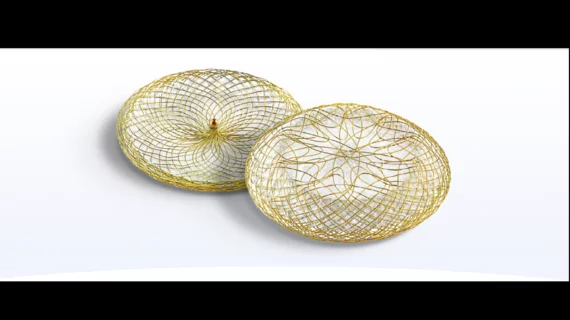Occlutech gains FDA approval for occluder device for atrial septal defects
Occlutech, a Swedish medical device company focused on structural heart disease, has received U.S. Food and Drug Administration (FDA) approval for its ASD Occluder for the treatment of atrial septal defects (ASDs). The company also gained FDA approval for its Pistol Pusher delivery system, and the two offerings will be commercialized throughout the United States as part of an exclusive arrangement with B. Braun Interventional Systems.
The Occlutech ASD Occluder is a self-expanding nitinol device for the transcatheter closure of ostium secundum-type ASDs. It includes two flexible discs that an interventional cardiologist attaches to both sides of the patient’s atrial septum using the Occlutech Pistol Pusher.
According to Occlutech, the ASD Occluder is intended to be a lifelong solution for patients with echocardiography-confirmed defects. It does contain nickel-titanium alloy, so patients allergic to nickel, titanium or nickel/titanium-based materials may experience certain allergic reactions.
“Today marks a momentous occasion for Occlutech and a significant leap forward in our commitment to advancing healthcare around the globe,” Occlutech CEO Sabin Bois said in a prepared statement. “I am thrilled the FDA has granted approval for the Occlutech ASD Occluder and Occlutech Pistol Pusher. Our mission has always been to improve the quality of life for patients; indeed, we have sold over 90,000 of our ASD devices outside of the U.S. Now, with the FDA's approval, we are poised to leverage our experience in the largest congenital and structural heart disease market in the world, with ASD closure representing a $40 million market in the U.S. with solid growth predicted.”
“This landmark approval is a huge milestone,” added Ziyad M. Hijazi, MD, chair of the department of cardiovascular diseases and a professor of pediatrics and medicine at Weill Cornell Medicine – Doha. “The Occlutech ASD Occluder has demonstrated excellent procedural outcomes and a low complication rate, per rigorous scientific study and clinical trials of more than 5,000 studied patients in retrospective, prospective and randomized clinical trials as well as comparative meta-analysis. Therefore, to have the device available to our patients in the U.S. will only serve to help thousands more people in need.”

